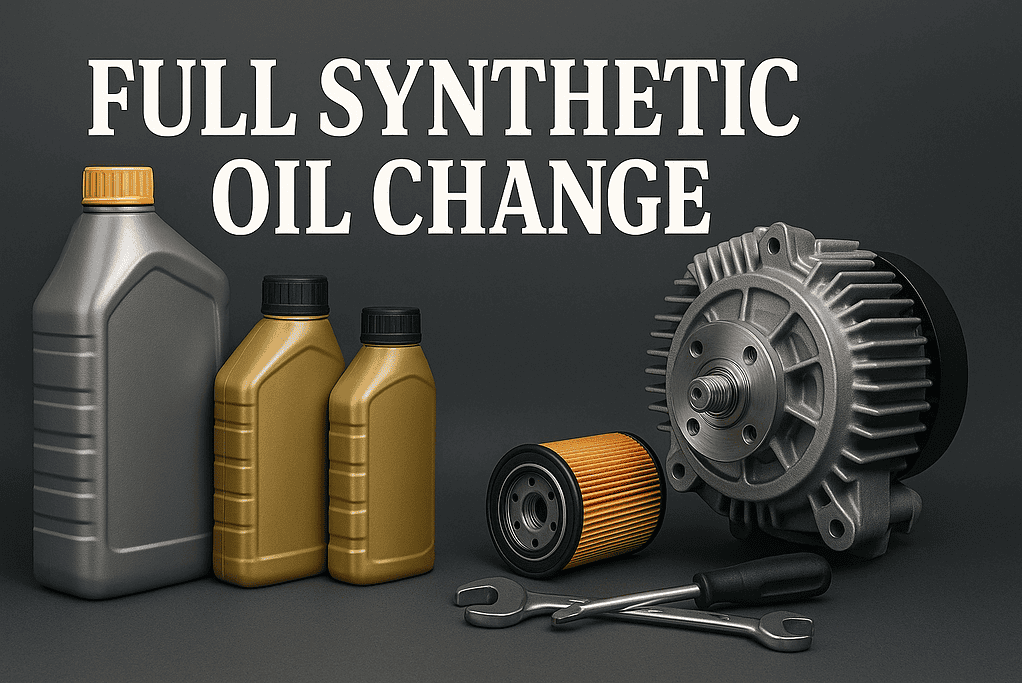As a vehicle owner, keeping your engine running smoothly is always a top priority. One of the best ways to ensure peak performance and long-lasting engine health is by regularly performing a full synthetic oil change. I’ve gathered extensive information from years of experience and research to help you understand why synthetic oil is so beneficial, how often you should change it, and what makes it stand out from conventional oils.
What Exactly is Full Synthetic Oil?
Simply put, full synthetic oil isn’t directly pumped from the ground like conventional oils. Instead, it’s carefully engineered in laboratories from chemically modified petroleum products. The result? Oil that’s cleaner, stronger, and more consistent.
Breaking Down Synthetic Oil Composition
- Base Stocks: Highly refined and purified oils, offering consistent molecular structure.
- Additive Packages: Ingredients like detergents and anti-wear agents keep your engine clean and protect moving parts.
How is it Different from Conventional Oil?
- Purity: Less contamination means smoother engine performance.
- Viscosity Stability: Performs better in extreme temperatures.
- Resistance to Breakdown: Less prone to evaporation and oxidation.
How is Synthetic Oil Produced?
- Base oil synthesis
- Enhancing oil properties through additives
- Blending and extensive quality checks
Why Switch to Synthetic Oil? The Real Benefits

Improved Engine Performance
From my personal experience, synthetic oils keep engines running smoothly, even in challenging conditions, by ensuring consistent lubrication.
Protection in Harsh Conditions
Synthetic oils handle extreme heat or freezing temperatures without breaking down, making cold starts easier and preventing overheating issues.
Longer Time Between Oil Changes
You’ll spend less time at the mechanic since synthetic oils last longer than traditional oils, making your life simpler and reducing maintenance hassle.
Better Fuel Efficiency
Less friction means your engine uses less fuel, saving you money over time.
Less Engine Wear
Quality lubrication dramatically reduces friction and metal wear, significantly extending your engine’s lifespan.
How Can You Tell Your Car Needs a Synthetic Oil Change?
- Louder than usual engine noises or knocking sounds
- Dark, gritty, or visibly dirty oil
- Smoke from your exhaust
- Oil warning or check engine light blinking
- Noticeably lower fuel efficiency
Your DIY Guide: How to Change Synthetic Oil Yourself
Gathering Your Tools
- Oil drain pan
- Proper wrench for the drain plug
- New oil filter
- Funnel, gloves, and rags
Easy Step-by-Step Oil Change
- Raise your vehicle safely.
- Remove the drain plug carefully and drain out old oil completely.
- Replace and tighten the plug securely.
- Swap out the old oil filter for a new one.
- Pour in your new synthetic oil using a funnel.
- Check the oil level, start your engine, and inspect for leaks.
- Dispose of your old oil responsibly.
How Often Should You Change Synthetic Oil?
- Typically, synthetic oil lasts between 7,500 to 15,000 miles or roughly 6 to 12 months.
- Your driving habits and vehicle’s requirements might adjust this timeframe slightly.
How Much Will a Synthetic Oil Change Cost?
What to Expect for Costs
- Synthetic oils average around $40–$70 for quality products.
- Labor charges typically range from $20–$40.
Cost Comparison: Synthetic vs. Conventional Oils
Though initially pricier, synthetic oils prove cost-effective due to fewer changes and better performance.
Caring for Our Environment
Synthetic oils are environmentally friendlier due to fewer oil changes. However, always ensure proper disposal and recycling.
Common Myths About Synthetic Oil Debunked
Myth: Synthetic Oil Causes Leaks
In reality, synthetic oils condition seals rather than damaging them.
Myth: Can’t Switch Back Once You’ve Used Synthetic Oil
Completely untrue! Switching back and forth is safe.
Myth: Harmful for Older Engines
Synthetic oil can actually rejuvenate and protect older engines better than conventional oils.
Picking the Best Synthetic Oil for Your Vehicle
Factors You Should Consider
- Viscosity ratings
- Manufacturer’s recommendations
- Certification and approvals
My Top 5 Picks from Amazon (Personally Recommended)
- Mobil 1 Extended Performance Full Synthetic Motor Oil – Reliable and durable for extended intervals.
- Castrol EDGE Advanced Full Synthetic Motor Oil – Exceptional temperature resistance.
- Valvoline Advanced Full Synthetic Motor Oil – Great for keeping your engine clean.
- Royal Purple High-Performance Synthetic Motor Oil – Ideal for performance enthusiasts.
- Pennzoil Platinum Full Synthetic Motor Oil – Environmentally friendly, made from natural gas.
FAQs Answered Clearly
- Is synthetic oil really worth it? Absolutely, due to its performance benefits and longevity.
- Can I switch between oil types safely? Yes, it’s entirely safe and manageable.
- What if I delay changing synthetic oil? Delaying can cause significant engine issues and reduce overall performance.
Wrapping It Up
Regular full synthetic oil changes keep your car running smoothly and efficiently, significantly extending its life. Trust me, making the switch pays off greatly in the long run.


